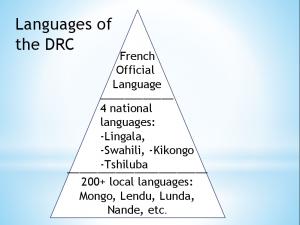
Attribution to Raymond Sangabau, English Professor at the University of Kinshasa. Provided by Dr. Sally Cook via email correspondence 12/12/16.
During my last Linguistics Practicum class period, we discussed the factors both helping and working against the Congolese in their quest to learn English, an absolute necessity for anyone who would like to be employed outside of minimum-wage, manual jobs.
In regards to their educational background, it appears that the majority of the population highly values education, as one of the Diversity Visa lottery’s requirements for the applicant is having a high school diploma. Many of immigrants practiced as doctors and professors in the DR Congo. However, some problems arise when the applicant’s family, such as their spouse or children, are not literate.
Linguistically, it is helpful that these immigrants are already polyglots. In the DR Congo, French is the official language. There are also several national languages, such as Lingala, Swahili, Tshiluba, and Kikongo. It is also helpful that these languages all share the roman alphabet with English. Finally, there are more than 200 local or tribal languages spoken, such as Mongo and Lunda. However, it is difficult for adults and teenagers to pick up on a new language because they have passed their critical period in brain development. Coming from backgrounds with limited English exposure, the instantaneous immersion can be overwhelming.
Finally, I would be hard-pressed to find a group who is more economically or socially motivated to learn English. There are several opportunities to learn English, from a wide berth of education students at Truman State to the public Vocational school in town. However, Truman students are not professional English teachers, and there is no standardized orientation or training about American culture or laws upon their departure or arrival. Moreover, opportunities to learn English are limited because new immigrants often work over-time, perhaps 60-70 hours a week at the aforementioned gruelling, labor-intensive jobs.
In short, there are a number of variables that both help and hinder the Congolese English acquisition. As discussed last week, language can be used as a measure of acculturation, making their socio-linguistic status a vital measurement for the forthcoming research.
Clearly important information — especially when interviewing.